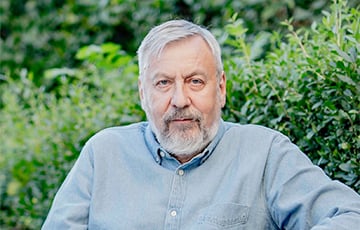Gabrielius Landsbergis: Lukashenka Is Not So Effective as Putin Would Like Him to Be
2- 20.07.2021, 10:25
- 10,894

In this context, the role of Belarus' neighbouring states, such as Lithuania, is increasing.
What role can Lithuania play in the political crisis in Belarus? Should the Lithuanian authorities coordinate their policies with the European Union and NATO? How fruitful can Western involvement in resolving the situation with Belarus be?
These questions were answered by Lithuanian Foreign Minister Gabrielius Landsbergis. He was invited to a conference last week at the Atlantic Council Policy Institute in Washington, D.C., Voice of America reports.
The Lithuanian Foreign Minister says repressions and persecutions of opposition activists and human rights activists in Belarus are increasingly alarming for the Lithuanian authorities. The Minister considers it an echo of Stalin's times, as well as the fact that the threads of the punitive ideology can run from Minsk to Moscow.
"This entire situation [in Belarus] resembles the establishment of a terror state," Gabrielius Landsbergis said at the beginning of the conversation. - It reminds us of the Soviet Union of the 1930s when there were purges, whole groups of people disappeared without a trace, were thrown into prisons, and their houses were subject to searches. The entire atmosphere was based on terror and fear. This is something new, and we have to remind ourselves that this is happening in Europe. It's also possible that the use of such brutal measures by the regime in Belarus coincided with the meeting between Lukashenka and Vladimir Putin for a reason. They have already met several times this year. That is, Lukashenka goes to his lord, gets carte blanche from him and does what he wants upon his return. This may be how it works".
Gabrielius Landsbergis points out that the problem of Belarusian-Russian relations is that Lukashenka's power relies on the police and the army. But all these security agencies need salaries, and the state of Belarusian economy cannot afford it, so Lukashenka has to borrow from Russia. This is why the imposition of sanctions against his regime, stresses the head of Lithuanian diplomacy, also adds to the pressure on Russia: Moscow has to pay Lukashenka's expenses. It begs the question: what is the Kremlin trying to gain from this?
"If Putin sees that the situation with Lukashenka's regime hits the West more than Lukashenka himself, this regime will suit Putin... But Lukashenka is not so effective as Putin would like him to be. He may have had the idea to remove Lukashenka from power and replace him with a more pro-Kremlin leader. However, such actions right before the elections in Russia would be a signal to [the Russians] that the people can indeed demand - win - change. It is a not great option for the Russian authorities," Landsbergis says.
In this regard, the role of Belarus' neighbours, such as Lithuania, is increasing. That is why Minister Landsbergis cited Lithuania's stance on security in Eastern Europe as the main foreign policy principle. He says the official Vilnius supports strong ties with other democratic countries and the strengthening of alliances, such as NATO. As for Russia, the Lithuanian authorities admit that the Kremlin is capable of any actions. As Landsbergis said, Moscow is using Belarus as a spearhead to strike at democratic Europe.
"I can be wrong, but it seems that Putin is very nervous at the moment, and he has many reasons for it. Firstly, another election is approaching in Russia. No dictator will like the images from last year's protests in Minsk of thousands of people marching in the streets demanding your resignation. No dictator will sleep better at night. Secondly, Putin sees that Belarus is slipping out of his hands, and most probably irrevocably. Certainly, the Russian president may be pursuing ulterior motives. Several months ago, he concentrated considerable military forces on the Ukrainian border. However, it raised talks between Europeans about Ukraine's membership in NATO. These talks are still fruitless, but they have resumed," the Lithuanian minister said.
Commenting on the future development of the situation in Belarus, Gabrielius Landsbergis underlined that the leading Western powers had to continue paying close attention to what was happening in Eastern Europe. According to him, becoming a member of NATO is not the core goal of such countries as Ukraine or Georgia. But a decline or lack of interest in the West in their fate, as well as in the fate of Belarus and the Baltic states, would be the worst case scenario for the states of the region.










